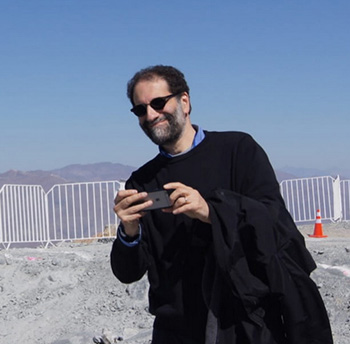Physics Professor Steven Ritz has received the 2019–20 Outstanding Faculty Award from the Division of Physical and Biological Sciences. The annual award is the division's highest honor for faculty achievement, recognizing combined excellence in research, teaching, and service.
“Steve Ritz is an extraordinary individual whose leadership, research, and devotion to teaching and service have made him an invaluable member of our campus and community,” wrote Paul Koch, dean of physical and biological sciences, in a letter to the division announcing the award.
An internationally recognized scholar and scientific leader, Ritz is also known as an exceptional teacher. He served as director of the Santa Cruz Institute for Particle Physics (SCIPP) for the past ten years before stepping down in December, managing the institute’s involvement in a broad array of scientific initiatives.
Ritz first rose to prominence as a leader of the Fermi Gamma-ray Space Telescope project, which opened a new window on the high-energy universe. Since its launch in 2008, Fermi has yielded significant advances in astrophysics, including the discovery of many new pulsars and supermassive black hole systems, studies of astrophysical particle acceleration, searches for signals of dark matter particles, and tests of fundamental laws of physics. Ritz served as project scientist for Fermi at NASA's Goddard Space Flight Center before joining the UCSC faculty in 2009, and he continued as deputy principal investigator for the mission's main instrument until 2013.
In 2013, Ritz took on a leadership role in another major collaboration as project scientist for the Rubin Observatory LSST Camera. The Vera C. Rubin Observatory, now under construction in Chile, will conduct the 10-year Legacy Survey of Space and Time (LSST), collecting vast amounts of data to address major scientific questions in astronomy, cosmology, and particle physics. The LSST Camera will be the largest digital camera ever constructed, with more than 3 billion pixels of solid-state detectors. In addition to his role as camera scientist, Ritz is also a member of the project’s science team and publication board.
In 2013-14, Ritz served as chair of the Particle Physics Project Prioritization Panel (P5), appointed by the Department of Energy to establish priorities for the field of particle physics. He also serves on numerous international scientific advisory committees and was a member of several National Academies of Sciences committees.
Alongside his extensive research and leadership efforts, Ritz has emerged as one of the leading teachers in the Physics Department. He received a UCSC Excellence in Teaching Award in 2012. His service within the Physics Department includes participation on the department’s Committee on Diversity and Climate, for which he served as chair during the previous academic year.
Ritz earned his B.A. in physics at Wesleyan University and his M.S. and Ph.D. in physics at the University of Wisconsin, Madison. He is a fellow of the American Physical Society and a recipient of the NASA Outstanding Leadership Medal.



